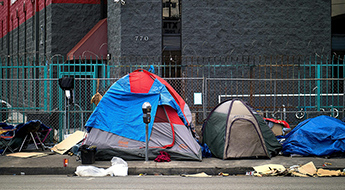New IPR Research: February 2024
Get all our news

This month’s new research from our faculty experts examines age differences in anxiety and depression among U.S. adults during the pandemic and childhood trauma and adverse birth outcomes. It also investigates why online political conversations are so toxic and how many billionaires have sought and held political office.
Social Disparities and Health
Age Disparities in Anxiety and Depression Among U.S. Adults During the Pandemic
Early during the COVID-19 pandemic, mental health issues were elevated among Americans, with young adults showing higher levels of depression and anxiety than older adults. In JAMA Network Open, Northwestern postdoctoral fellow Sarah Collier Villaume, the University of Florida’s Shanting Chen, and IPR developmental psychobiologist Emma Adam investigate whether there were age disparities in anxiety and depression during the COVID-19 pandemic and whether they continued across the first two years of the pandemic. The researchers analyzed over three million responses to the Census Bureau’s Household Pulse Survey administered to U.S. adults from April 2020 through August 2022, along with weekly state-level data on COVID-19 cases and deaths. The survey included reported symptoms of anxiety and depression, in addition to measures of income and exposure to COVID-19. They discovered that levels of anxiety and depression were highest early in the pandemic, but as the pandemic continued, levels declined among adults who were aged 40 or older while they remained elevated in adults between the ages of 18–39. The disparity in anxiety and depression could be traced to economic precarity in young adults—who earned less and were less likely to own homes than older adults. The researchers argue that while more research is necessary to understand what factors contribute to the age gap, mental health care and economic policies should be targeted to young adults to reduce mental health issues. Emma Adam is the Edwina S. Tarry Professor of Human Development and Social Policy.
Childhood Trauma and Adverse Birth Outcomes
Research has demonstrated that childhood trauma has long-term health impacts on maltreated children. However, a relatively unexplored area is the impact of childhood trauma on adult pregnancy outcomes. IPR health psychologist Greg Miller, obstetrician, gynecologist, and IPR associate Ann Borders, and former IPR postdoctoral fellow Alexa Freedman conduct a study, published in Scientific Reports, to determine if childhood trauma affects whether a mother’s baby is born small for their gestational age or is delivered pre-term. The researchers used the self-reported Childhood Trauma Questionnaires for 657 mothers who were less than 21 weeks pregnant in 2013–15 and collected birth weight and pre-term delivery data after the babies were born. In this study, childhood maltreatment includes physical, sexual, and emotional abuse and physical and emotional neglect. The researchers analyzed whether childhood trauma was associated with adverse birth outcomes. Results show that although maternal childhood trauma was not associated with pre-term births, mothers who had experienced childhood trauma had a 61% increased risk, from 7.6% to 14.1% chance, of delivering a baby that is small for their gestational age. Additionally, each subsequent form of childhood maltreatment that a mother had experienced corresponded with a 27% increased risk of their child being born small for their gestational age. However, the study found no clear mechanism to explain the link between the mother’s childhood maltreatment and the birth of a baby small for their gestational age. The findings help us understand that experiences, even before conception, can have implications for pregnancy. Greg Miller is the Louis W. Menk Professor of Psychology.
Politics, Institutions, and Public Policy
The Political Discourse of Engaged Partisans Is Toxic Even When Politics Are Irrelevant
The lack of civility in political conversations has increased on social media platforms, but why is political discourse on these platforms so hostile? In a study in PNAS Nexus, Northwestern postdoctoral scholar in psychology Michalis Mamakos and IPR social psychologist Eli Finkel analyze Reddit comments across different subreddits to understand what drives toxic behavior. To understand whether commenting was more toxic in political contexts, they analyzed 260 million Reddit comments between 2011 and 2022 from over 9,000 subreddits about politics, such as r/hillaryclinton and r/The_Donald, in addition to topics outside of politics, like r/wrestling and r/librarians. They also reviewed hundreds of millions of comments from over 6.3 million users during the same period in subreddits that were not about politics to compare the comments of the users who also engaged in partisan subreddits to the comments of the users who did not engage in partisan subreddits. Mamakos and Finkel show that the comments of the users who posted in partisan subreddits were more toxic, less polite, displayed more moral outrage, and were angrier than those by people who did not post in subreddits about political topics. Comments by politically engaged Reddit users are toxic even if they are not discussing politics, suggesting that people who choose to participate in political conversations are generally uncivil. Because the overrepresentation of uncivil people in online political discussions can shut down the voices of the less hostile individuals, it could lead the public to believe that polarization is deeper than it really is and increase democratic backsliding.
Billionaire Politicians
From Silvio Berlusconi in Italy to Thaksin Shinawatra in Thailand and Donald Trump in the U.S., billionaire politicians have established themselves across the globe. In Perspectives on Politics, Northwestern political scientists Andrew Roberts, an IPR associate, Daniel Krcmaric, and Stephen Nelson introduce an original dataset of over 2,000 billionaires found in the Forbes World’s Billionaires List who have sought and held political office. After collecting the individual billionaires’ political activity, the researchers tracked who held or, in a few cases, only sought, formal political offices such as president, prime minister, or legislator. They discover that over 11% of the world’s billionaires have tried for or held political positions—242 of 2,072—which the researchers point out is a far higher rate than any other group. Most billionaires were directly elected by citizens, the majority to legislative positions, and 80% of them won their elections. The data reveal that billionaires are more likely to seek or hold office in autocracies (29% of billionaires) than in democracies (5%). Also evident in the data: Billionaire politicians belong to more right-leaning political parties, especially in Europe. The researchers conclude that the large number of billionaires in political office is concerning but that, at least in democracies, officeholders may have more accountability than the ultra-wealthy who wield influence and power behind the scenes.
Photo credits: Unsplash
Published: February 28, 2024.


